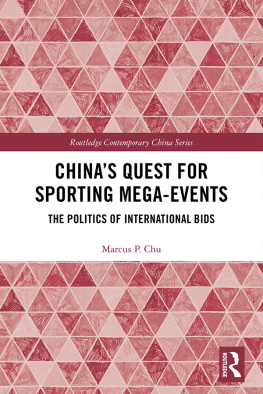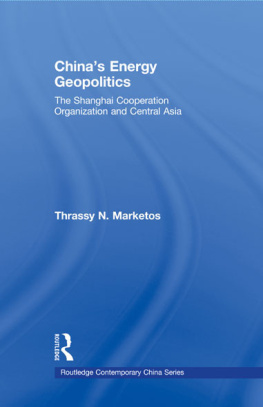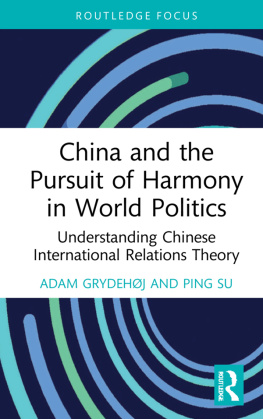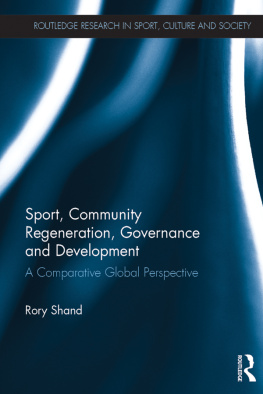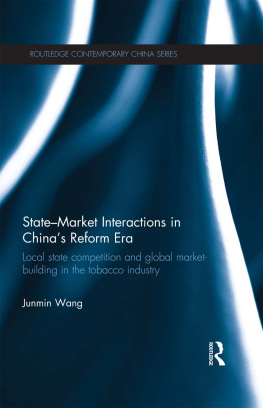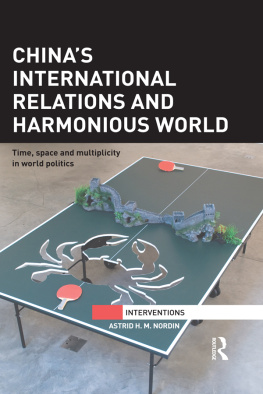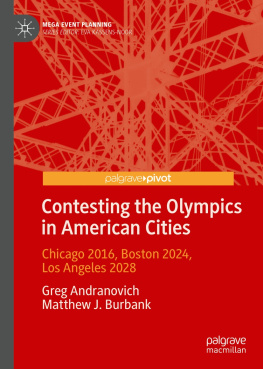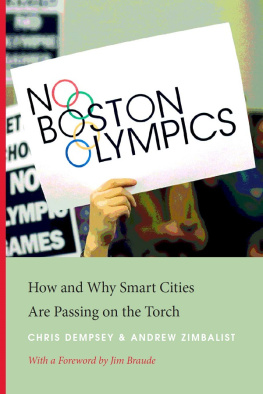Table of Contents
Guide
Print Page Numbers
Chinas Quest for Sporting Mega-Events
The holding of sporting mega-events is viewed by the Chinese authorities as a prominent way to push forward the Reform and Opening Up, arouse patriotism among the public, and display national resurgence in the world. Chinese cities have thus keenly pursued the Olympics, the Asian Games and the Universiade since the 1980s. Theoretically, the President, the Premier and the central government should provide all-out support, so boosting Chinese cities odds of success. Yet the reality shows that their attitude toward the bids varies from case to case. Through reviewing the 20 bidding cases, this book aims to demystify the reasons behind this phenomenon.
The findings provide an in-depth account of (1) how domestic and international political factors determine the state leaders blessing and silence as well as the central governments backing, indifference and opposition, and (2) how the bids for the sporting mega-events are used to serve the broader political goals of the Chinese authorities at home and abroad. Additionally, they shed light on the political strategies to boost the Chinese cities chances of success, and the political reasons for their wins, losses and discontinuation, in the bidding contests. In summary, this book vividly elucidates the inseparable nature of politics and sport in China.
Marcus P. Chu is assistant professor in the Department of Political Science, Lingnan University, Hong Kong.
Routledge Contemporary China Series
Civilian Participants in the Cultural Revolution
Being Vulnerable and Being Responsible
Francis K.T. Mok
Hong Kongs New Identity Politics
Longing for the Local in the Shadow of China
Iam-chong Ip
Youth Economy, Crisis, and Reinvention in Twenty-First-Century China
Morning Sun in the Tiny Times
Hui Faye Xiao
The Chinese Economy and its Challenges
Transformation of a Rising Economic Power
Charles C.L. Kwong
Keywords in Queer Sinophone Studies
Edited by Howard Chiang and Alvin K. Wong
Macau 20 Years after the Handover
Changes and Challenges under One Country, Two Systems
Edited by Meng U Ieong
Doing Labor Activism in South China
The Complicity of Uncertainty
Darcy Pan
Chinas Quest for Sporting Mega-Events
The Politics of International Bids
Marcus P. Chu
For more information about this series, please visit: www.routledge.com/Routledge-Contemporary-China-Series/book-series/SE0768
Chinas Quest for Sporting Mega-Events
The Politics of International Bids
Marcus P. Chu

First published 2021
by Routledge
2 Park Square, Milton Park, Abingdon, Oxon OX14 4RN
and by Routledge
52 Vanderbilt Avenue, New York, NY 10017
Routledge is an imprint of the Taylor & Francis Group, an informa business
2021 Marcus P. Chu
The right of Marcus P. Chu to be identified as author of this work has been asserted by him in accordance with sections 77 and 78 of the Copyright, Designs and Patents Act 1988.
All rights reserved. No part of this book may be reprinted or reproduced or utilized in any form or by any electronic, mechanical, or other means, now known or hereafter invented, including photocopying and recording, or in any information storage or retrieval system, without permission in writing from the publishers.
Trademark notice: Product or corporate names may be trademarks or registered trademarks, and are used only for identification and explanation without intent to infringe.
British Library Cataloguing in Publication Data
A catalogue record for this book is available from the British Library
Library of Congress Cataloging in Publication Data
A catalog record for this book has been requested
ISBN: 978-0-367-20667-3 (hbk)
ISBN: 978-0-429-26281-4 (ebk)
Typeset in Galliard
by Wearset Ltd, Boldon, Tyne and Wear
Contents
I am grateful to Brian Bridges, Annie Chan, Chan Che-po, Gerald Chan, Chen Hon-fai, Francis Cheung, Ted Fung, Lawrence Ho, Joanne Lai, Alan Lee, Peter Leung, Li Pang- kwong, Simon Li, Vic Li, Liu Junli, Lao Liu, Lu Zhouxiang, Zita Lui, Vivian Lun, Ma Yuhuai, Eric Man, Mai Sasahara, Shalendra Sharma, Eric Wong, Jack Wong, Natalie Wong, Wong Yiu-chung, Max Wu, Xiang Xi, Xu Xiaohong, Eilo Yu and Raymond Yuen for their advice, encouragement and help. I am equally indebted to Simon Bates and Tan ShengBin in Routledge Contemporary China Series for their professional suggestions about my proposal and manuscript, as well as Louise Lubke Cuss for her careful proofreading and editing service. My special thanks go to Lingnan University direct grant (no. DR19B6), which supported the research of . Lastly, I would like to express a deep sense of gratitude to my parents. This book could not have been completed without their care and love.
| AFC | Asian Football Confederation |
| AGA | Asian Games Association |
| ANC | African National Congress |
| APEC | Asia Pacific Economic Cooperation |
| BIE | Bureau International des Expositions |
| CCP | Chinese Communist Party |
| CEPA | Closer Economic Partnership Arrangement |
| CGAS | China General Administration of Sport |
| CNCS | China National Commission of Sport |
| COC | Chinese Olympic Committee |
| DPP | Democratic Progressive Party |
| ECFA | Cross-Straits Economic Cooperation Framework Agreement |
| FIFA | International Federation of Association Football |
| FISU | International University Sports Federation |
| GATT | General Agreement on Tariffs and Trade |
| IAAF | International Association of Athletics Federations |
| IGF | International Gymnastic Federation |
| IOC | International Olympic Committee |
| ITTF | International Table Tennis Federation |
| IWGA | International World Games Association |
| KMT | Kuomintang |
| LegCo | Legislative Council |
| LOCPG | Central Peoples Government Liaison Office in Hong Kong |
| MFN | Most Favoured Nation |
| NATO | North Atlantic Treaty Organization |
| NPC | National Peoples Congress |
| OCA | Olympic Council of Asia |
| PNTR | Permanent Normal Trade Relations |
| PRC | Peoples Republic of China |
| ROC | Republic of China |
| SAR | Special Administrative Region |
| SARS | Severe Acute Respiratory Syndrome |
| SF&OC | Sports Federation & Olympic Committee of Hong Kong, China |
| WHA | World Health Assembly |
| WTO | World Trade Organization |
While its people suffered in the ruthless political struggles of the Cultural Revolution, China on October 25, 1971 successfully expelled Taiwan, becoming a full member of the United Nations. Within the next 12 months, President Mao Zedong met US President Richard Nixon in Zhongnanhai. The UK, Japan and West Germany all established diplomatic relations with Beijing. In this context, a number of international sporting organizations encouraged China to join them. The most populous country on the planet was thus successively recognized by the Asian Games Association, which later was renamed as the Olympic Council of Asia (OCA), in 1973, the International University Sports Federation (FISU) in 1975, and the International Olympic Committee (IOC) in 1979. Since then, Chinese athletes have been entitled to take part in the Asian Games, the Universiade, the Olympics, and other activities overseen by these three powerful athletic bodies.

